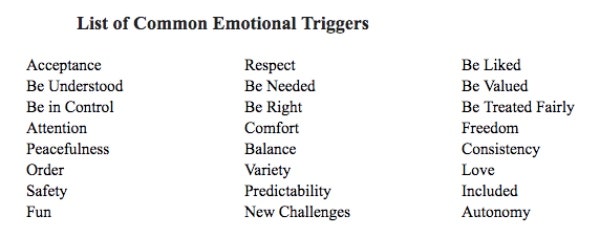Is Yelling Verbal Abuse? 5 Ways To Stop Yelling During Heated Arguments
Are you a yeller? Here's how to stop.
 getty
getty If you're always yelling at your partner in your relationship, the destructive behavior can feel like verbal abuse.
There's no way to sugarcoat it. Yelling at someone during an argument only adds fuel to the fire.
Unless you're yelling at someone to quickly alert them and help them get out of harm's way, yelling is not a relationship-enhancing behavior. Quite the opposite.
If you’re a yeller, it’s time to put down your weapon and learn to open your heart.
Yelling is just a wall that pushes others away, preventing you from finding love.
Here are 5 steps to stop yelling during heated arguments and free yourself from this destructive pattern.
1. Know what triggers you.
The first step is awareness. Have you given much thought to the triggers that make you start yelling?
A trigger is a specific thought, action, or event that causes an emotional reaction. It’s often linked to past traumatic events, likely from childhood, and may not actually be related to the current, triggering situation.
Are you aware of when you’re triggered? When a person is triggered, they lose self-awareness and become reactive. A part of the brain literally shuts down and hinders logical thinking.
If yelling is your defensive mechanism, that’s how you’ll react. Your triggers are very personal and unique to you. Different things trigger different people.
For example, one person may look forward to her mother’s weekly phone call and the questions her mother asks. Meanwhile, another person feels obligated to talk with her mother every week, and gets triggered by every question she asks.
That’s how unique and different triggers can be. A behavior that triggers one person may not trigger another person at all. They might even enjoy it.
Nonetheless, triggers are based on common emotional needs not being met.
Below is a chart listing some common triggers:

What is it for you? What are your triggers? And what is the childhood source of them?
What triggers you most about someone close to you has a lot to do with an unmet childhood need.
Becoming aware of what triggers you and what makes you start yelling will offer you greater insight on how to come to your rescue, calm yourself down, and choose a different, more loving reaction to the current upsetting situation.
2. Let the other know when you're triggered.
Instead of yelling, be aware when you're triggered, and let your partner know. Don’t shut down, put up, yell, or resort to passive-aggressive behavior.
Remember, in a triggered state, you're literally unable to think logically. That’s why yellers often say things they later regret. That’s how a lot of doors get slammed or dishes get broken.
First, acknowledge that you're triggered, first to yourself. Then, you can say to the person who either triggered you or is around you:
- "I’m getting triggered."
- "What you just said is triggering a reaction in me."
- "I notice I am having a reaction."
- "I’m starting to get defensive."
- "I think I am getting a button pushed."
- "I’m getting my 'not good enough' button pushed."
Make sure you stay present as best as you can by connecting to your body and your breath.
If you do talk, use "I" statements, don't bring up the past, and avoid using the words "always," "never," "every time," "constantly," etc.
- "You're constantly ignoring me."
- "You always make a mess."
- "You never listen to me."
- "Every time I suggest something, you say no."
In addition, don’t make any threats!
Sometimes when you're triggered, you might threaten to divorce or split up. Those types of discussions need to be held when you're not upset. You need to be ready to have a calm conversation about it, if that’s your true intention.
So, let others know you're triggered in a calm way, as best as you can, and then get yourself to "emotional safety."
3. Leave, gracefully.
The best thing you can do in a triggered state is to leave! And not just moving out or running off. Not even just leaving the room and slamming the door on your way out.
Instead, get yourself to safety. You are in an emotionally-triggered state and you need time to calm down.
Let the other person know that you need a break, but that you’ll be back. Let them know how long you think you’ll be gone for.
This may sound easy, but in a triggered state it’s one of the most challenging things to do, especially if you're a yeller.
So, leave gracefully. Don’t cause a scene, stay centered, and get away from the triggering environment.
4. Process your emotions.
This process is important, especially if you want to heal the reactive behavior of yelling.
When you process your emotions, you get to the core of what’s actually bothering you. You’ll be able to move forward from a place of greater awareness to invoke positive change.
In this step, you want to acknowledge your emotions. You can journal, take a walk, release tension, get some guidance, or do whatever you need to do to take care of yourself emotionally.
Bring yourself back to a state of calm.
Take the time to process your emotions with a four-step process that allows you to understand what’s underneath your uncomfortable feelings and triggers.
When you have an uncomfortable feeling, it simply means you have an unmet need. It’s really that simple.
Understanding your core needs and having a plan to get them met will bring positive transformation into your life and your relationships.
5. Speak clearly and address your core needs.
After you've processed your emotions, you're hopefully clear about a core need.
First things first, if you yelled, apologize for yelling. Acknowledge that you don’t want yelling to be a part of your relationship and that you're working hard to take responsibility for changing that pattern.
Now, with greater clarity of your core need, focus on speaking to that core need during your discussion with the other people or person who triggered you.
A common core need we all have is to "feel heard and understood." Yelling will definitely keep you from getting that core need met.
Either way, whatever your core need is, speak to that.
If you have a core need for cleanliness, speak to that — not to how your partner is such a messy person.
If you have a core need to feel valued or have attention, speak to that — not to how your partner "always" ignores you.
If you have a core need for acceptance, speak to that — not to how your partner is "always" so critical of "everything" you do.
So, if you want to stop yelling and start having a deeper sense of love with those close to you, be aware of your triggers, let those you love know when you're triggered, leave gracefully, take time to process your emotions, and come back in a calm state and address your core needs.
If you have the courage to choose these five steps instead of yelling, you’ll transform and attract better relationships into your life.
Anna-Thea is an author and Certified Divine Feminine Educator. If you’d like to improve your communication in your relationships check out Anna-Thea's free online course "Discover How to Really Feel Heard and Understood."

